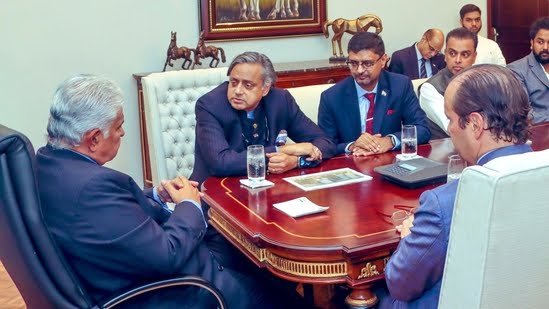Panama City, Panama – In a significant diplomatic victory for India, Panama’s Foreign Minister Javier Martinez Acha unequivocally stated his country “cannot tolerate any kind of terrorism” after a high-profile Indian parliamentary delegation, led by Congress MP Shashi Tharoor, presented compelling evidence of Pakistani Army officials attending funerals of UN-designated terrorists.
This crucial meeting, part of India’s ongoing global outreach following “Operation Sindoor,” aimed to firmly establish India’s resolve against Pakistan-sponsored terrorism and strengthen international solidarity.
India’s All-Party Delegation Presents Undeniable Evidence
The delegation, a powerful representation of India’s political spectrum, included prominent figures such as Tejasvi Surya (BJP), Shashank Mani Tripathi (BJP), Bhubaneswar Kalita (BJP), Sarfaraz Ahmad (JMM), Gants Harish Madhur Balayogi (TDP), Milind Deora (Shiv Sena), and former Indian Ambassador to the US, Taranjit Sandhu.
On Wednesday, the delegation held key discussions with the President of the Republic of Panama, Jose Raul Mulino, and Foreign Minister Javier Martinez Acha. During these meetings, they presented stark photographic evidence: images of uniformed Pakistani Army and police officials, including those from the “highest threat echelons,” openly mourning at the funerals of UN-designated terrorists killed during India’s “Operation Sindoor.”
“There was at least one individual whose name had been listed by the United Nations Sanctions Committee,” Tharoor later elaborated, emphasizing the undeniable link. He took a pointed swipe at Pakistan, noting, “This is the country that now says we are innocent. We did not do it,” adding, “one does not mourn for people they do not know.”
Panama Stands Firm with India Against Terrorism
Panama’s Foreign Minister Acha’s response was robust and supportive. Speaking to news agency ANI, he declared, “Regarding terrorism, we stand with India. We cannot tolerate any kind of terrorism. We cannot tolerate countries sponsoring terrorism.” He further highlighted the shared democratic values, stating, “We are a democratic country. India is the largest democracy in the world, which values principles, and we will fight against any kind of terrorism together.”
Tharoor hailed his meeting with Acha as “successful,” not only in conveying India’s strong message on terrorism but also in solidifying the broader cooperation between the two nations. He noted that Foreign Minister Acha received their message with a “very receptive and open-hearted way.”
Echoing this sentiment, Panama’s Vice Minister for Foreign Affairs, Carlos Arturo Hoyos, affirmed his country’s shared commitment to foundational beliefs with India. “We are strongly committed not only to protecting our shared values but of promoting those values in every bilateral and multilateral stage in which we participate, including, of course, the United Nations Security Council in which we are a non-permanent member for the next two years,” Hoyos stated, underscoring Panama’s dedication to global peace and security.
Strengthening Bilateral Ties and Future Engagements
Beyond the critical discussions on terrorism, the meetings also laid the groundwork for enhanced bilateral relations. Foreign Minister Acha expressed enthusiasm for a future visit to India, stating, “We will also try to make an agenda for our President to visit India. We have a promise from my good friend Mr Tharoor that Prime Minister Modi will come to Panama soon.”
This high-level engagement in Panama is a crucial part of India’s ongoing diplomatic offensive, sending a clear and stern warning to Pakistan and terrorist organizations globally. As Tharoor emphasized in Panama, there should be “no doubt” about the severe price terrorists will pay for their actions. This collaborative stance with Panama reinforces the growing international consensus that terrorism, regardless of its origin or perpetrators, will not be tolerated.
The recent diplomatic offensive led by Shashi Tharoor in Panama marks a significant stride in India’s global efforts to counter terrorism and expose its state sponsors. Beyond the strategic implications, this mission underscores the universal abhorrence of terrorism and the growing international consensus against it. The unequivocal stance taken by Panama’s Foreign Minister, Javier Martinez Acha, resonating with “no tolerance for terrorism,” serves as a powerful testament to the impact of direct, evidence-based diplomacy. It highlights that the fight against terrorism is not a localized conflict but a shared global responsibility, demanding unwavering solidarity from democratic nations.
The stark images of Pakistani Army officials mourning designated terrorists presented by the Indian delegation are more than just photographs; they are irrefutable evidence that cuts through denial and obfuscation. This visual proof, coupled with the unified voice of India’s all-party delegation, has clearly resonated with Panama’s leadership, reinforcing the understanding that supporting terrorism, whether overtly or covertly, carries significant international repercussions. The commitment from Panama to collaborate on fighting terrorism and promoting shared democratic values on multilateral platforms, including the UN Security Council, signifies a deepening of bilateral ties that extends far beyond political pleasantries. It’s a pragmatic alliance built on mutual respect and a shared vision for a more secure and peaceful world.
Ultimately, this diplomatic success in Panama is a crucial chapter in India’s ongoing narrative against terrorism. It sends a clear message to those who harbour and support terror that their actions will be exposed and condemned on the global stage. It also reaffirms India’s resolve to actively engage with the international community, leveraging diplomacy and compelling evidence to build a united front against this pervasive threat. As nations like Panama join India in this crucial fight, the net tightens around those who seek to destabilize global peace, moving us closer to a future where terrorism finds no safe haven.

